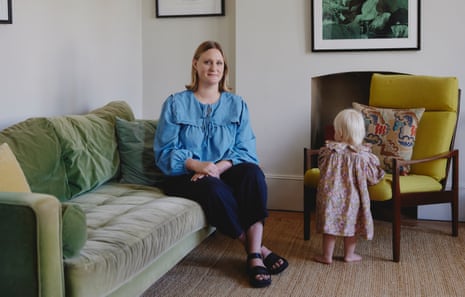Health
Woman Shares Struggle with Rare Visual Snow Syndrome

In February 2023, Emma Loffhagen noticed troubling changes in her vision as she transitioned from maternity leave back to work. After retraining from a wedding cake-maker to a food stylist, she found herself juggling the demands of motherhood and a burgeoning career. However, what began as mere exhaustion quickly escalated into a persistent and alarming visual disturbance.
Initially attributing the symptoms to migraines, which she had experienced in the past, Emma soon realized something was amiss when she began seeing flashing lights and an overwhelming brightness that distorted her surroundings. Despite reassurances from family and medical professionals that it was likely a migraine, her symptoms persisted.
On multiple occasions, she sought help at the Accident & Emergency department, where tests revealed no apparent issues with her eyes. The experience left her feeling increasingly anxious. Emma documented her symptoms, which included intense after-images, severe light sensitivity, and tremors, leading her to fear a more serious neurological condition.
A visit to a private neurologist and an MRI followed, both yielding inconclusive results. As she searched for answers, Emma stumbled upon information regarding visual snow syndrome, a condition affecting approximately 2% of the UK population. Although initially skeptical, she found that the descriptions of the syndrome mirrored her experiences.
In April 2023, she received a formal diagnosis from her neurologist. Despite the confirmation being validating, it was also disheartening. The condition lacks widespread recognition, even among many healthcare professionals, and there is no known cure. Emma was offered epilepsy medication, but without any assurance it would alleviate her symptoms, she opted not to pursue it.
Adjusting to life with visual snow syndrome has been challenging. Emma now wears sunglasses indoors to manage her light sensitivity, which often draws attention and makes her feel self-conscious. Social situations have become increasingly difficult; she recalls leaving a friend’s hen party in tears due to the overwhelming flashing lights.
Her young son is beginning to grasp her condition. Recently, he advised his father to keep the blinds closed to protect Emma’s sensitive eyes, a moment that underscored the impact of her condition on family life. Emma expressed her desire to be more present for her children, lamenting the limitations her symptoms impose on daily activities and interactions.
The challenges extend to her sleep patterns, as she frequently wakes with shaky hands and foggy vision. In her search for support and potential treatment options, Emma is exploring a clinical trial at St Thomas’s Hospital in London and considering joining the Visual Snow Initiative in the United States.
Living with visual snow syndrome has instilled a sense of uncertainty in Emma’s life. She grapples with questions about whether her condition will improve or worsen. Despite appearing outwardly fine, she navigates a persistent struggle that remains largely invisible to those around her. Emma’s story highlights the importance of awareness and understanding regarding rare medical conditions that profoundly affect individuals and their families.
-

 World2 days ago
World2 days agoCoronation Street’s Shocking Murder Twist Reveals Family Secrets
-

 Entertainment4 months ago
Entertainment4 months agoKate Garraway Sells £2 Million Home Amid Financial Struggles
-

 Entertainment3 months ago
Entertainment3 months agoAnn Ming Reflects on ITV’s ‘I Fought the Law’ Drama
-

 Health3 months ago
Health3 months agoKatie Price Faces New Health Concerns After Cancer Symptoms Resurface
-

 Entertainment3 weeks ago
Entertainment3 weeks agoCoronation Street Fans React as Todd Faces Heartbreaking Choice
-

 World3 weeks ago
World3 weeks agoBailey Announces Heartbreaking Split from Rebecca After Reunion
-

 World5 days ago
World5 days agoKevin Sinfield Exceeds Fundraising Goal Ahead of Final Marathons
-

 Entertainment3 months ago
Entertainment3 months agoCoronation Street’s Carl Webster Faces Trouble with New Affairs
-

 Entertainment4 days ago
Entertainment4 days agoTwo Stars Evicted from I’m A Celebrity Just Days Before Finale
-

 Entertainment3 months ago
Entertainment3 months agoWhere is Tinder Swindler Simon Leviev? Latest Updates Revealed
-

 Entertainment4 months ago
Entertainment4 months agoMarkiplier Addresses AI Controversy During Livestream Response
-

 Science2 months ago
Science2 months agoBrian Cox Addresses Claims of Alien Probe in 3I/ATLAS Discovery











